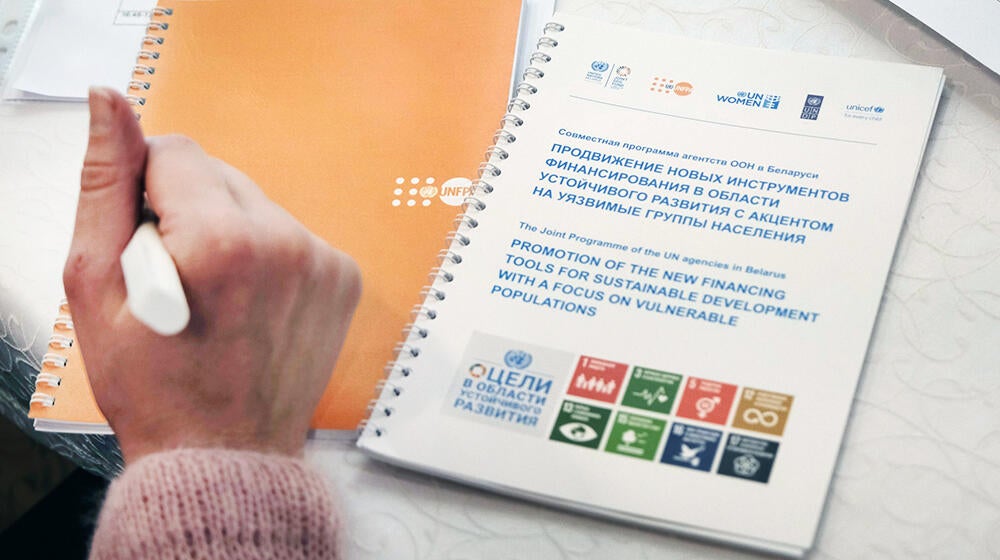Heath and education sector experts and representatives of WHO, UNDP and UNFPA gathered together to summarize the results of UNFPA’s work in 2022 under the joint programme of the UN Agencies “Promoting new financing instruments for sustainable development with a focus on vulnerable groups in Belarus”. The Joint Programme is funded by the Joint SDG Fund.
Within the framework of the UN joint project, the United Nations Population Fund (UNFPA) provides support to the health sector of the Republic of Belarus with the purpose of improving budget planning and spending efficiency. New financing instruments in the field of sustainable development are promoted through three drivers recommended in the UNFPA Strategic Plan for 2022-2025:
- prioritized support of vulnerable groups;
- innovations and digitalization;
- data and evidence.
The Republican Scientific and Practical Center for Medical Technologies, Informatization, Administration and Management of Health (RSPC MT) has been the main partner in conducting the research and preparing economic estimates taking into account new financing instruments. The findings of the research conducted by RSPC MT have demonstrated cost-efficiency of cervical cancer prevention measures and introduction of the diagnosis-related groups (DRGs) as one of the instruments of performance-based budgeting.
During 2022, international experience and national practices of introducing efficient budgeting methods in the health sector have been reviewed with description of constraints impeding the introduction of performance-based budgeting and development of general recommendations for its adoption in Belarus’ health sector.
One of the recommendations is to ensure harmonization of the national development strategies, the government programs and the Sustainable Development Goals (SDGs).
Under its component of the joint program of the UN Agencies, in 2022 UNDP Belarus conducted a Rapid Integrated Assessment (RIA) helping the country to assess the level of preparedness and institutional capacity for integrating SDGs into the development planning programs at the national and local levels. The findings of the analysis suggest that the government program "Public health and demographic security" is one of the programs contributing to most SDGs. Though this government program accords a priority attention to SDG 3, the analysis of the activities has demonstrated that the program also contributes to other SDGs such as SDG 1, 4, 5, 8, 9, 11, 16.17.
To maximize the use of the data obtained by the experts for drafting practical recommendations for the country, it was decided that UNFPA, UNDP and RSPC MT should hold a joint detailed discussion of the research findings.
To improve budgeting efficiency in the health sector, it was proposed to use the system of health accounts as a source of data. For this purpose, the analysis has been carried out and its findings suggest that the system of health accounts of the Republic of Belarus can become an effective instrument for the management of public resources to achieve the Sustainable Development Goals.
The staff of the Department of Financial Management and Health Informatization of the Belarusian Medical Academy of Postgraduate Education (BelMAPO) developed a training course (40 academic hours) for the heads and economists of health facilities focusing on performance-based budgeting in the health sector. The training program of the course was officially approved by the rector of BelMAPO. The first training sessions were held in September 2022. The opportunity for taking the course individually and in a distance mode is also offered. The manual "Performance-based budgeting and diagnosis-related groups as an instrument of improving efficiency of the healthcare system" has been developed to help the trainees.
In the time of economic instability, it is particularly important to introduce innovative budgeting instruments in order to provide support to all population groups and to ensure equitable access to high-quality health services even in the conditions of budget constraints.
In 2023, it is planned to develop a projection tool on reproductive health, to finalize the research and to develop evidence-based proposals for ensuring financial resilience of the healthcare system of the Republic of Belarus through:
- restructuring of medical care delivery in inpatient settings,
- digitalization of the healthcare system,
- diagnosis-related groups for financing inpatient care.
The UNFPA-executed component of the Project is expected to deliver economically justified recommendations on efficient financing aimed at the achievement of Sustainable Development Goals in the health sector.


